EUGENIO HERMOSO MARTÃNEZ (Fregenal de la Sierra, Badajoz, 1883 - Madrid, 1963). "Young man with flowers". Oil on canvas.
Lot 95
About Seller
Setdart Auction House
Carrer Aragó 346
Barcelona
Spain
Setdart Subastas was born in 2004 and is currently the first online art auction in Spain with solidity, prestige and reliability guaranteed by our more than 60,000 users. Setdart has a young, dynamic and enterprising team ready to successfully manage the purchase and sale of art works through custom...Read more
Estimate:
EUR€6,000 - EUR€8,000
$6,451.61 - $8,602.15
Absentee vs Live bid
Two ways to bid:
- Leave a max absentee bid and the platform will bid on your behalf up to your maximum bid during the live auction.
- Bid live during the auction and your bids will be submitted real-time to the auctioneer.
Bid Increments
| Price | Bid Increment |
|---|---|
| EUR€0 | EUR€10 |
| EUR€200 | EUR€25 |
| EUR€500 | EUR€50 |
| EUR€1,000 | EUR€100 |
| EUR€3,000 | EUR€200 |
| EUR€5,000 | EUR€500 |
| EUR€10,000 | EUR€1,000 |
| EUR€20,000 | EUR€2,000 |
| EUR€50,000 | EUR€5,000 |
About Auction
By Setdart Auction House
Nov 10, 2021
Set Reminder
2021-11-10 08:00:00
2021-11-10 08:00:00
America/New_York
Bidsquare
Bidsquare : 19th & 20th Century paintings and Decorative Arts
https://www.bidsquare.com/auctions/setdart-auction-house/19th-20th-century-paintings-and-decorative-arts-7800
Setdart Auction House sofia@setdart.com
Setdart Auction House sofia@setdart.com
- Lot Description
EUGENIO HERMOSO MARTÃNEZ (Fregenal de la Sierra, Badajoz, 1883 - Madrid, 1963). "Young man with flowers". Oil on canvas. Signed in the lower left corner. Measurements: 75 x 48 cm; 91 x 63 cm (frame). Eugenio Hermoso began his studies at the School of Fine Arts of Santa Isabel de HungrÃa in Seville, with a scholarship from the City Council and the Provincial Council of Badajoz. In 1901 he moved to Madrid to continue his training at the School of San Fernando, and there he also dedicated himself to making copies of the great masters in the Prado Museum. During these years he frequented the Ateneo and the CÃrculo de Bellas Artes, being praised by intellectuals such as PÃo Baroja, DÃaz Canedo and Juan Ramón Jiménez. He then began a study trip that took him to France and Belgium, as well as the most important Italian cities: Genoa, Pisa, Rome, Naples, Florence, Venice and Milan. On this trip Eugenio Hermoso came into contact with the European avant-garde, meeting the Impressionists and admiring the portraits of Egyptian sarcophagi from the Roman period. In 1912 he embarked for England, exhibiting his work in London that same year. In 1918 he settled in Madrid forcibly and definitively. From then on he frequented the nightly gatherings of the Nuevo Levante café, attended by the brothers Ricardo and PÃo Baroja, Ignacio Zuloaga, José Gutiérrez Solana and Rafael de Penagos, among others; and the Maisón Doré café, together with Jacinto Benavente, Manuel and Antonio Machado and Francisco Villaespesa. In 1922 he held his first major exhibition at the Museum of Modern Art in Madrid, with public and sales success. Professor at the Escuela Superior de Bellas Artes de San Fernando in Madrid, he was appointed academician in 1941. Seven years later he was awarded the medal of honor at the National. Under the pseudonym of Francisco Teodoro de Nertóbriga he published his "Autobiography" in 1955, and signed his satirical paintings. He is mainly represented in the Fine Arts Museums of Badajoz and Seville, as well as in other public and private collections.
- Shipping Info
-
In-house shipping available. Please inquire at admin@setdart.com.
-
- Buyer's Premium



 EUR
EUR CAD
CAD AUD
AUD GBP
GBP MXN
MXN HKD
HKD CNY
CNY MYR
MYR SEK
SEK SGD
SGD CHF
CHF THB
THB

















